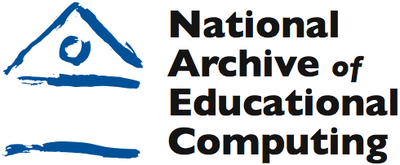National Archive of Educational Computing
| When |
Sep 01, 1992
to
Jul 31, 2013 |
|---|---|
| Where | Brentwood |

Aim: To design & develop a historical archive and narrative for developments in technology enhanced learning.
Reflection: I have learnt about the history of educational computing, the methods of curation and cataloguing materials, the processes of dissemination and sharing of artefacts and the nature of voluntary research activity. I have benefited from relationships with the museum, library and gallery sector and developed thinking about the semantic web and questions of interpretation within the scope of historical analysis.
Contribution: Since leaving Ultralab I have taken sole responsibility for this work, establishing working methodology, designing a participative web site and convening and attending events to disseminate knowledge. My part 90% (Initially with Stephen Heppell and Greta Mladenova)
Originality, impact and importance: The archive is unique in the UK in its focus on educational computing. Its impact has been on international education conferences and events where it has exhibited and in its support for other projects such as the BBC’s Domesday Reloaded. I believe its importance will be found in the future to satisfy a desire to interpret the historical development of technology enhanced learning and to mine the ideas which have been developed and forgotten, but are ripe for re-invention.
This project began at a time when the last remnants of the first national programme for schools, the Microelectronics Education Programme (MEP) were closing. Stephen Heppell and I rescued a number of key collections from regional and national centres and others donated materials.
Ultralab hosted the archive until 2006, when I took ownership and hosted the work within Core Education UK. Various supporters and organisations have added funds for the archive, which continues to act as a focus for proposals to enhance, disseminate and make relevant the wealth of materials it contains.
This is the summary document about the archive:
The development of educational computing in the UK began in the early 1970s. This has resulted in a wealth of knowledge, experience and artefacts. It is timely now to look at these materials and to represent them as an accessible and substantially complete collection of one nation’s pioneering and world-renowned innovation.
Aims
- disseminate the archive so that past successes (and failures) can better inform the future potential for learning with ICT;
- enhance the archive by using the internet, emulation, video digitisation and virtual reality techniques to provide access to artefacts which have become difficult to view, operate and maintain;
- expand the archive so that it represents the range of innovations and practice in educational computing with personal stories, interpretations and analyses.
 Audience
Audience
- Public - parents interested in home & school learning with ICT, those interested in its history;
- Learners - children researching projects about technology and learning;
- Teachers, lecturers and trainers - in initial and in-service professional development;
- Researchers - engaged in policy, educational technology and pedagogical research worldwide;
- Educational managers - decision-makers considering purchase and implementation of ICT learning resources;
- Policy makers - regional and national decision makers when considering effective ICT strategies.
- Industry - eager to benefit from effective ideas and wishing to see their contribution over time.
Methods
- using multimedia, emulation and virtual reality techniques to provide interesting and stimulating representations of historical artefacts;
- recording in digital formats the experience of many of the participants in educational computing innovation in the form of oral and video histories;
- digitising existing video materials and software from the collection and indexing them for viewers to see how educational computing was pioneered;
- categorising and recording its collection in a publicly-available database on the internet;
- providing a publicly accessible location where the archive and all supporting resources can be used.
Objectives in 2013
- preserve the existing collection;
- employ staff / identify volunteers / recruit doctoral students to catalogue the existing collection;
- source additional artefacts to grow the collection;
- create an organisation with charitable status to permit a long-term, self-sustaining mechanism for funding;
- plan a representative, substantial national archive of UK educational computing which is open to the public;
- establish a world-wide-web site which publishes the searchable database of the archive collection and a selection of representations of software and hardware artefacts, personal records and official documents.
More details can be found on the National Archive of Educational Computing web site.
(Words: 861 )


